Tag Archives: Lois Maxwell
For Your Eyes Only (1981)
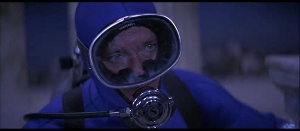
After Moonraker pulled in more money than God, James Bond’s producers could have pushed the envelope even further into self-parody and silliness. Thank your personal gods they didn’t and the Guy Hamilton/Lewis Gilbert aesthetic of tension-free action scenes, idiotic Bond girls and villains unworthy of their gorgeously sets/lairs finally checked out with the Carter Administration. It was so past time to go back to basics even the producers knew it. For a second, it looked as if they were going to go all out and hire a fourth actor for their lead roll, just to top everything off.
Makes sense when you think about it. By this point, James Bond was a bonafide icon and the movie-going world seems to like its icons young. Roger Moore was fifty-four at this point, over a decade older than the First Bond when he quit for the second time. Despite this, For Your Eyes Only is as heavy on the action as anything we’ve seen in this series. It’s also the first straight-up Cold War spy thriller we’ve seen since From Russia with Love. No supervillains! No international extortion! No plots to start World War III! What the hell is going on here? Is this even a James Bond film? Continue reading For Your Eyes Only (1981)
Moonraker (1979)
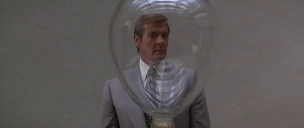
For various reasons, I haven’t been feeling so well lately. And when I feel like shit I like to take it out on bad movies. So I am very glad to be reviewing a Bond film I honestly despise, considered by some people to be The Worst James Bond Movie Ever Made. Of course, things would be pretty boring if it weren’t also acclaimed by almost-as-many people as the quintessential representation of everything this series is, was, or should be. It’s the Bond movie parents think they can safely pass down to their children…especially if their children have a pre-existing interest in sci-fi films, like some of us.
Because of that, it’s the first James Bond movie a lot of people (who aren’t me) see, forever coloring their expectations of the franchise. I’ll admit I’m predisposed to enjoy some of the elements you Normals may find the most ludicrous. But even for me, Moonraker goes right off the rails, abandoning any pretensions of being a spy-fi thriller made for people with functioning brains. In that, and one more area, it is the quintessential Bond movie: things start off well, but get steadily worse as they go on…and this movie does go on. At length. So at least it’s in good company, eh? Continue reading Moonraker (1979)
The Spy Who Loved Me (1977)

“Art from adversity” is a tired cliche at this point, casually bandied about by all manner of creative arts professionals and self-appointed self-help gurus. If those people every wanted a Bond movie to back them up, they could do a lot worse than The Spy Who Loved Me. Nothing went right with this and it still manages to be the best Bond film in eight long years…that must’ve seemed even longer the first time around. No one sacrificed any first born children or danced in circles until the rain came: they simply struck a balance. Spy gets a lot of fan points by following the Bond Formula more faithfully than either of its Moore Era predecessors…but it also racks up a lot of my points ignoring that Formula wherever it sees fit (until the end of course…but we’ll get there).
This is not so inconceivable as you’ve been led to believe. What else are Goldfinger and On Her Majesty’s Secret Service but elaborate permutations of Dr. No? Those three films trace a clear trajectory, pulling the spy-fi genre from its Noir/Thriller roots towards the supervillain-stomping grounds usually occupied by comic book superheroes. The Spy Who Loved Me continues into territory broad enough for the new landscape of Big, Dumb Summer Movies already taking shape in the late 70s. Continue reading The Spy Who Loved Me (1977)
Live and Let Die (1973)
First, a salute to Baron Samedi:

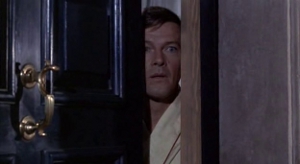
Great Tracy’s ghost, it’s finally here! The debut of Roger Moore, the Third and Longest-Lasting Bond (so far), who’ll carry the weight of these next seven films for a very long time. I feel like a kid at Christmas because the Moore Era contains some of the series best and worst, irrevocably cementing Bond’s place in modern cinema as a character who’d outlive his actors….for better and worse…
Where Connery feared the role would dominate his career, Moore came to it already “groomed” by eight years as TV’s The Saint. He seemed to embrace that….despite having to cut his hair and loose some weight for this part. He’d packed it on and let it grow out during his disastrous slow-motion train wreck of a TV show The Persuaders! (Yes, the exclamation point’s part of the title – whaddya expect? It was the 70s.) At that point, Moore could’ve helmed ten bad TV shows and people still would’ve flocked to their theaters to see him as James Bond in (a heavily altered facsimile of) Ian Fleming’s Live and Let Die. Continue reading Live and Let Die (1973)
Diamonds Are Forever (1971)

Never say never. Connery shouted it from every rooftop he could find during and after the production of You Only Live Twice. When Eon came begging him back he took a page from SPECTRE’s playbook and extorted the largest amount of money anyone had ever received for a lead role up to that time, officially beginning our modern Lead Actor Salary Arms Race. The number 1.25 million is thrown around a lot in the attendant literature, though I’ve heard conflicting reports as to whether that’s in pounds or dollars.
Either way, it was a healthy chunk of change at a time of worldwide economic upheival. Connery, to his credit, used that cash to establish The Scottish International Education Trust, which still puts money in the hands of artistic Scots to this very day. He also got United Artists to back his friend Sidney Lumet’s movie The Offense, which everyone should go out and see. It’s unquestionably better than Diamonds Are Forever. Continue reading Diamonds Are Forever (1971)
On Her Majesty’s Secret Service (1969)
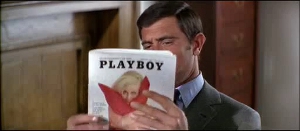
Like I said,
To this day I wish Connery had stuck around for one last swan song. Bond fans could’ve avoided a whole lot of heartache…
But then again, maybe not. I like Connery, but not the bored, sick-of-it-all self-parody he became by the time he filmed You Only Live Twice. So I might as well confess: I’m one of those people who actually like On Her Majesty’s Secret Service. I won’t dare call it “the best Bond film ev-ahr” when we’ve still got sixteen of these damned things to go…but I will stick my neck out far enough to call it the best film since Goldfinger. Halfway through, I guessed they had to work through two films worth of same-y-feeling crap before anything good escaped the pipeline.
Turns out that’s truer than I’d like it to be. OHMSS (as it’s reverently known) was originally meant to follow Goldfinger. Returning series screenwriter Richard Maibaum stated pecking out the script, an adaption of Fleming’s tenth Bond novel, while the film rights to Thunderball were still up in the judicial air. After Thunderball hit, the warm Swiss summer of 1966 made most of OHMSS’ Big Ticket action sequences prohibitively expensive (if not outright life-threatening). Production relocated to Japan and re-purposed everything for You Only Live Twice. When that did even better than Thunderball, OHMSS finally saw daylight…after a two-year search for the Next James Bond. Continue reading On Her Majesty’s Secret Service (1969)
You Only Live Twice (1967)
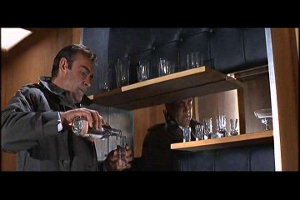
And now we get to talk about Sequelitis. You’d expect the fifth Bond movie to bear some resemblance to its predecessors, but You Only Live Twice can’t seem to help calling attention to its heritage. Personally, I blame Roald Dahl. He should’ve turned this project down from the start. He and Ian Fleming were apparently good friends in real life, but their writing styles couldn’t be further from each other if you placed them on opposites sides of the cosmos. Dahl hated the novel that shares this film’s title and, twenty-one years after the film premiered, flat-out admitted to Starlog magazine “I didn’t know what the hell Bond was going to do.” Producers Albert Broccoli and Harry Saltzman answered by giving him The Formula, whole and (more or less) complete by 1966, at the latest.
As Dahl defined The Formula would go on to define this series:
“Bond has three women through the film: If I remember rightly, the first gets killed, the second gets killed and the third gets a fond embrace during the closing sequence. And that’s the formula. They found it’s cast-iron. So, you have to kill two of them off after he has screwed them a few times. And there is great emphasis on funny gadgets and love-making.”
With this information, the author of Charlie and the Chocolate Factory became the author what is essentially Dr. No 2: In Japan. You can tell how many people actually bother to read Dahl’s work by whether or not they call this film “silly.” Sorry, Charlie, but compared to The Chocolate Factory (published the same year as this film’s eponymous novel) and especially compared to The Glass Elevator, this is Roald Dahl phoning it in after he’s taken a fist-full of horse tranquilizers. And he still managed to create one of the most influential films of the series, large portions of which have become fertile ground for parody, satire and knowing reference. So I come not to bury this fifth Bond film, but to lament what could have been…and argue that, as “silly” as things get in this picture, they could’ve stood to get a whole lot “sillier.” There might be more to recommend. Continue reading You Only Live Twice (1967)
Thunderball (1965)
“Well…can’t win them all.”

Way back in my Halloween 4 review I half-joked that, in the vast multiverse of franchise films, only Star Trek and Godzilla have managed to field strong fourth entries. I was immediately “well, actually”-ed by friend of the site David Lee Ingersoll‘s contention that Thunderball “isn’t bad.” Shopping this critique around, I realized Thunderball divides quite a few Bond fans…though nowhere near as much as some Roger Moore movies I could, and will eventually, mention.
I should’ve expected this. Now that we’re on Film Number Four, we can see the full scope of Bond’s world. From this point on, we’ll have plenty of time to consider all its wonderfully disparate elements and decide which we’d prefer to see…as opposed to what we’re actually watching. Because what we’re watching will increasingly serve to remind us of other, better, James Bond films. And why shouldn’t it? Goldfinger made a ton of money, so why not give the people more of that? Making this film knowing in their guts that it would be a hit must’ve felt like a license to supply heroin to William S. Burroughs. Especially since the bones of this script were already four years old by the time cameras rolled. Continue reading Thunderball (1965)
Goldfinger (1964)
“Sir, I’m aware of my shortcomings. But I’m prepared to continue this assignment in the manner you suggest…if I knew what it was about. Sir.“
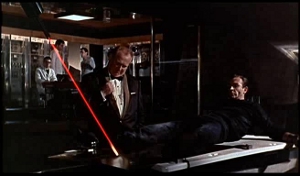
And so we come to the production model: James Bond v. 3.0 Alpha. Current series producer Michael G. Wilson has said they start off every film trying to make the next From Russia with Love (only to end up, more often than not, with “the next Thunderball“), and while there’s truth to this, Bond’s second outing isn’t nearly as influential as his third. A more accurate assessment might read, “They start out each film trying to make the next Goldfinger” because Goldfinger carved the Bond Template in stone, no matter the producer’s frequent assurances that they’ve “updated” the character for each generation.
This is the first film that starts off with a “true” pre-credit sequence: Bond in Mexico, taking care of some heroin smugglers by bombing their supply of Nitro. (Every good drug kingpin knows its best to keep the nitro within easy walking distance of the production facilities.) Back at the hotel, Bond’s girl of the night asks why he always carries a gun. Bond straight-up admits “I have a slight inferiority complex.” Only slight, James? You’re British and it’s the 60s – your country’s still recovering from WWII. Military bases the world over are either closing down or being taken over by those Ugly Americas with their machine guns. The sun’s setting on the British Empire for the first time in four hundred years, and you, Mr. Bond – a walking example of Hefnerian overcompensation – you’re talking about “slight” inferiority complexes? Continue reading Goldfinger (1964)
